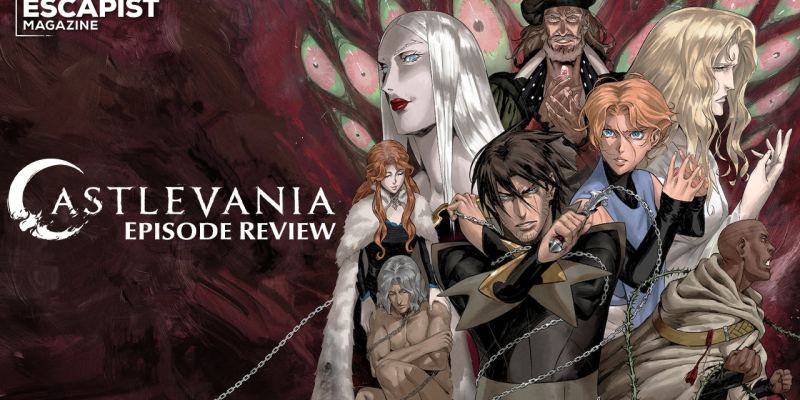The following review contains spoilers for Castlevania season 3, episode 4, “I Have a Scheme.”
While I’m enjoying my time with Castlevania a lot, I think it’s fair to say that season 3 is a much different beast than its previous seasons. That’s not to say that’s a bad thing, as change is always good and there’s only so long that gratuitous violence can hold my attention, but what’s presented in its place needs to be equally engaging. I feel that while most of the subplots in season 3 have ranged from good to strong, “I Have a Scheme” is where you’re going to decide which of the subplots is most captivating to you and which ones fall flat on their face.
Alucard’s (James Callis) plot this episode was utterly dull primarily because of his pupils Sumi (Rila Fukushima) and Taka (Toru Uchikado). We learn more about their backstory and how they were slaves to one of Dracula’s generals, Cho. Cho was portrayed as powerful and sadistic as she played with and eventually killed a samurai while making all of her slaves watch, but we hardly got to know about Cho as a character last season before she died. Why should I care about a tertiary character and her relationship to new characters who, frankly, aren’t that engaging? It comes across as too little too late.
A bigger gripe with Sumi and Taka as characters is that their voice actors are simply okay. When acting opposite the James Callis of Battlestar Galactica and starring in a cast alongside Richard Armitage and Graham McTavish, their abilities pale in comparison and, at worst, come off as amateurish. Their line readings don’t come across naturally and their performances don’t really match their characters’ facial expressions. When they’re providing voiceovers for Cho’s slaughter it works better, but they still leave a lot to be desired.

Issac’s (Adetokumboh M’Cormack) subplot gets touched upon only briefly, which is a shame given just how much character development he received last episode. Isaac leaves the Captain’s (Lance Reddick) ship and faces the darkness of humans once more, almost negating all of the good will towards humanity that the Captain attempted to teach him. It almost feels tragic, but instead it feels rushed since it comes in at the tail end of the episode with hardly any significant development.
We also have a super brief scene where we discover that Morana (Yasmine Al Massri) and Striga (Ivana Miličević from Banshee) are lovers. That’s nice and all, but I worry we’re going to go from having four subplots to adding a fifth one. Hearing them talk about Carmilla as the dreamer of the group and some of her backstory before becoming the badass villainess we know her as (despite her surprising lack of presence this season so far) is compelling, but the show can’t afford many more plot threads.
However, the strange thing is that while trying to check in on each Castlevania subplot can be a lot at times, it never feels like the viewer is working when actually watching it. We spend only enough time with each of our main characters that we get a tiny advancement of their storyline, but it’s still easy to follow. This mostly has to do with the episodes’ relatively short lengths. All of the episodes this season so far clock in at less than half an hour and never overstay their welcome. Sure, some scenes can probably be pared down a bit, like when Lenore (Jessica Brown Findlay) and Hector (Theo James) talk about his treatment in Dracula’s court, but that’s really it. Minor criticisms.
The bulk of “I Have a Scheme” focuses on the events of Lindenfeld and Saint Germain (Bill Nighy) finally gaining entry into Prior Sala’s (Navid Negahban) priory. There’s still a lot we don’t know about either character, with the two of them primarily discussing the nature of Hell, night creatures, and Sala’s faith in God, but the scene at least shows that Germain, for whatever he’s hiding, seems to be more trustworthy than Sala is.
To give credit to whoever did character design, Sala has a great look to him that is immediately unsettling. Even from his first appearance in episode one, he’s clearly not on the up and up and stands out as a potential threat to everyone in Lindenfeld. It’s his eyes. While nearly all other characters have smaller and more natural-looking pupils, Sala’s feel very cartoonish, but giving off a distinct impression that this is a man who hardly — if ever — sleeps. He says in the episode that he has much work to do in the priory, and I could easily imagine that he has a tenuous grip on reality due to whatever scheme he’s cooking up with the other monks that lasts well into the night.
Meanwhile, Trevor (Richard Armitage) and Sypha (Alejandra Reynosa) start their investigation into the affairs of the priory with some good old-fashioned questioning and intimidation. Not much progress is made on their part besides confirming that something magical is happening there, though Sypha has no clue what it could be. To his credit, I’m slowly starting to like the Judge (Jason Isaacs), if only for his sharp wit and great one-liners. It seems like whenever he speaks, Jason Isaacs easily conveys that this is an intelligent man who’s in control and won’t put up with mediocrity. It’s entertaining and I hope we get more time to spend with him soon.
While “I Have a Scheme” is perfectly fine and has no real major flaws, a lot of that tight focus from last episode seems to have disappeared. When Castlevania tries to check up on all of its subplots and gives each character time to shine, it can become a bit overwhelming. This probably works better when you binge the show all in one sitting so the cracks are smoothed over a bit, but by taking it at a slower pace, it’s clear that some episodes and subplots are more underdeveloped than others. How Castlevania can rectify this is unclear, but while I’m liking what I’m seeing, I’m not completely loving it yet.
